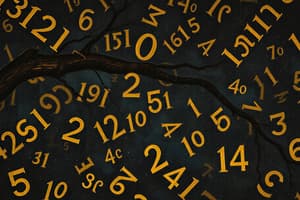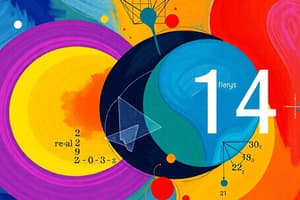Podcast
Questions and Answers
What is the value of i?
What is the value of i?
i
What is the value of i squared (i^2)?
What is the value of i squared (i^2)?
-1
What is the value of i cubed (i^3)?
What is the value of i cubed (i^3)?
-i
What is the value of i to the fourth power (i^4)?
What is the value of i to the fourth power (i^4)?
What is the square root of -1?
What is the square root of -1?
What are natural numbers?
What are natural numbers?
What are whole numbers?
What are whole numbers?
What are integers?
What are integers?
What are rational numbers?
What are rational numbers?
What are irrational numbers?
What are irrational numbers?
What are real numbers?
What are real numbers?
What are complex numbers?
What are complex numbers?
What is the additive inverse?
What is the additive inverse?
Flashcards are hidden until you start studying
Study Notes
Imaginary Unit
- The symbol i represents the imaginary unit.
- i is defined as the square root of -1.
Powers of i
- i² equals -1.
- i³ equals -i, indicating that as powers increase, the values cycle through.
- i⁴ equals 1, completing the cycle where every fourth power returns to 1.
Categories of Numbers
- Natural Numbers: All positive numbers excluding zero, starting from 1.
- Whole Numbers: Includes zero along with all positive numbers, starting from 0.
- Integers: Comprises all whole numbers and their negative counterparts, including negative numbers.
- Rational Numbers: Any number, decimal, or fraction that can be expressed as a fraction (e.g., 1/2, 0.75).
- Irrational Numbers: Numbers that cannot be expressed as fractions; they have non-repeating, non-terminating decimal expansions (e.g., √2, π).
- Real Numbers: Encompasses all numbers that can be found on the number line, excluding complex numbers.
- Complex Numbers: Composed of a real part and an imaginary part represented as a + bi, where a is real, and b is imaginary (e.g., 3 + 9i).
Additional Concepts
- Additive Inverse: The additive inverse of a number is its opposite, achieved by switching its sign; for example, the additive inverse of +5 is -5.
Studying That Suits You
Use AI to generate personalized quizzes and flashcards to suit your learning preferences.




